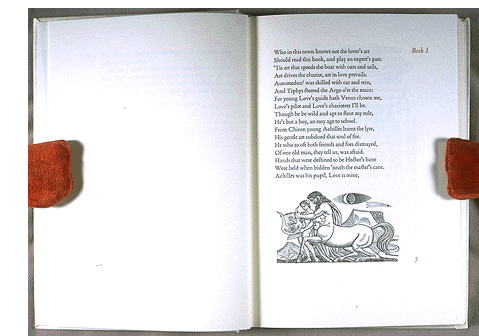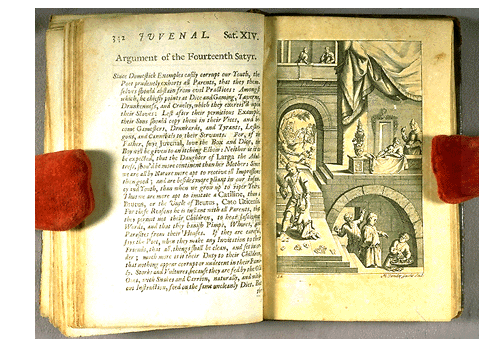Roman Education
In Roman society the family formed the nucleus for the inculcation of moral and social education. The primary objective was the preservation of the status quo. Although the society was a class system comprised of patricians and plebians, conflict eventually paved the way for educational reform and opportunities amongst slaves and lower class citizens. The female education was essentially a domestic one, with knowledge passed on from mother to daughter, primarily instruction in domestic skills related to the management of the home. Mothers also instructed young boys until their education was turned over to the father who guided them in their vocational, physical, and military training. Military training included riding, fencing, javelin-throwing, discus, and weaponry.
Less emphasis was placed on a literary education than the Greeks, however, rudimentary skills such as reading, writing, and arithmetic were taught. By the end of the 4th century, elementary schools, or ludus, appeared in Rome, presided over by a teacher or magister ludi. Corporal punishment was common disciplinary practice in the schools, used to break the free will of the student student, it was believed to be essential to the "hardening" process, in order to strengthen and toughen the youth to sustain the hard knocks that come with public life.
Quintilian was a teacher of rhetoric whose Institutio Oratoria provided a systematic plan for oratorical preparation for all stages of education for the young boy. Quintilian, and notable other educators after him, philosophically opposed the use of corporal punishment practiced in the ludus. He believed that the practice broke the spirit of the impressionable youth, and that, in the end gentle guidance and nurture were of more long-term benefit in the development of the child. Severe punishment, he believed, robbed the child of genuine spirit essential to creativity and innovation.
The orator served as the model of the educated man in Rome. Cicero's De Oratore (55 B.C.) was primarily concerned with the education of his own son, Marcus. Principally concerned more with higher education than elementary or secondary curricula, Cicero recommended that the orator have a knowledge of ethics, psychology, military science, medicine, natural science, geography, astronomy, and most importantly, history, law, and philosophy. The orator needed to be well versed in rhetoric, which meant he knew to choose his words carefully, and to structure his arguments to be persuasive. As a public figure, he was to live a life of action and purpose, truthful in speech and deed. He was raised up to be a demonstrative ideal and role model for other citizens, especially for the next generations of young boys.
Juvenal, Satire VII (image)
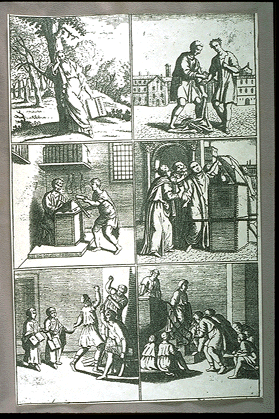
Juvenal (Decimus Junius Juvenalis, 60?-140? A.D.
Juvenal was a satirist of Roman vices during the Roman Empire. Little is known about his life, however, most accounts recognise that he spent time in the military and ended his life in exile for having criticized a popular stage performer who was favored by the emperor Domitian. He wrote sixteen satires which are typically divided into five books. In these Juvenal attacks public manners and morals. Presented here in the exhibition are Satire VII and Satire XIV. Satire VII presents Juvenal's opinion on education as it relates to learning for the various professions of law, history, rhetoric, and grammar. Satire XIV illuminates the corruptive nature of domestic education, especially the strong influence of role models both positive and negative.
Parents demonstrate behaviors that are regenerated in their children, and may provide negative examples perpetuating vice and bad habits in behaviors such as gaming, drinking, and sexual carousing. Themes and motifs such as gaming (cards and dice), taverns, and sexual and romantic love, are presented in visual and verbal forms as activities which draw students away from proper moral pursuit of virtue, such as study provides. Satiric educational themes, of a bacchanal nature, originate with Juvenal and Martial, exemplify representations of student life of the ancient and modern universities, and are perhaps epitomized during the Middle Ages in the goliardic verse, or light and bawdy Latin verse of the Carmina Burana, written during the twelfth and thirteenth centuries by university students and travelling clerics.
The Art of Love, Ovid. (image/text Chiron)
Book I.
Who in this town knows not the
lover's art
Should read this book, and play an expert's
part.
'Tis art that speeds the boat with oars and
sails,
Art drives the chariot, art in love
prevails.
Automedon was skilled with car and rein,
And Tiphys steered the Argo o'er the main:
For young Love's guide hath Venus chosen me,
Love's pilot and Love's charioteer I'll be.
Though he be wild and apt to flout my rule,
He's but a boy, an easy age to school.
From Chiron young Achilles learnt the lyre,
His gentle art subdued that soul of fire.
He so oft both friends and foes dismayed,
Of one old man, they tell us, was afraid.
Hands that were destined to be Hector's bane
Were held when bidden 'neath the master's
cane.
Achilles was his pupil, Love is mine.
Figure 2. Ovidius Naso, Publius. Ars Amatoria, or, The Art of Love. [Mount Vernon, New York, Printed for the Limited Editions Club, by A. Colish, 1971]. Translated by B.P. Moore and illustrated by Eric Fraser. This book measures 24 cm. and is number 1010 of 1500 copies. The illustration is an excerpt from Book I, and depicts Cheiron the Centaur, the wise tutor of Achilles, Jason, and Asclepius.
Ovid (Publius Ovidius Naso, 43 B.C.-?17 A.D.)
Ovid was a Roman poet, the first major writer to grow up under the Roman Empire. His parents set their sights on a career in law for their child, only to find out later that he had decided to pursue poetry. He was sent to study law in Athens where he became committed to becoming a poet. Shortly after he returned to Rome he gained recognition as one of the most outstanding poets of his generation. His first series were love elegies Amores, and later Heroides, which displayed his gift for psychology in monologues in the form of love letters written between the mythological lovers of Hero and Leander, and Paris and Helen. Ars Amatoria, or, The Art of Love, an instant success, was written at the age of forty. His greatest recognized work, Metamorphoses, reflects the disillusionment of his generation. Written in fifteen books, it is an historical epic tracing the world from chaos to the apotheosis of Julius Caesar. During the Middle Ages, Ovid's poetry was one of the major sources of Occidental knowledge of antiquity. Ovid was revered in the medieval courts as the great preceptor of courtly love.
Juvenal, Satire XIV (image)
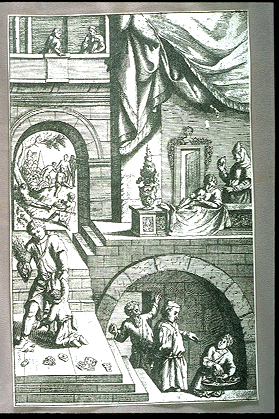
Juvenal (Decimus Junius Juvenalis, 60?-140? A.D.
Juvenal was a satirist of Roman vices during the Roman Empire. Little is known about his life, however, most accounts recognise that he spent time in the military and ended his life in exile for having criticized a popular stage performer who was favored by the emperor Domitian. He wrote sixteen satires which are typically divided into five books. In these Juvenal attacks public manners and morals. Presented here in the exhibition are Satire VII and Satire XIV. Satire VII presents Juvenal's opinion on education as it relates to learning for the various professions of law, history, rhetoric, and grammar. Satire XIV illuminates the corruptive nature of domestic education, especially the strong influence of role models both positive and negative.
Parents demonstrate behaviors that are regenerated in their children, and may provide negative examples perpetuating vice and bad habits in behaviors such as gaming, drinking, and sexual carousing. Themes and motifs such as gaming (cards and dice), taverns, and sexual and romantic love, are presented in visual and verbal forms as activities which draw students away from proper moral pursuit of virtue, such as study provides. Satiric educational themes, of a bacchanal nature, originate with Juvenal and Martial, exemplify representations of student life of the ancient and modern universities, and are perhaps epitomized during the Middle Ages in the goliardic verse, or light and bawdy Latin verse of the Carmina Burana, written during the twelfth and thirteenth centuries by university students and travelling clerics.
Bindings of volumes [Rivington’s Iliad]
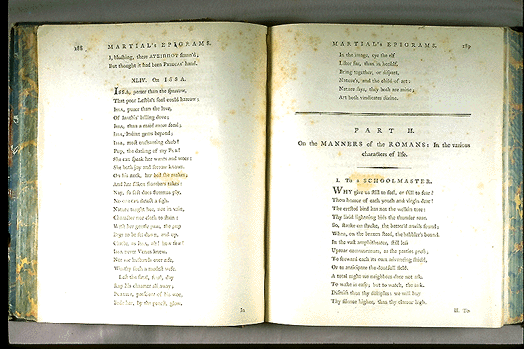
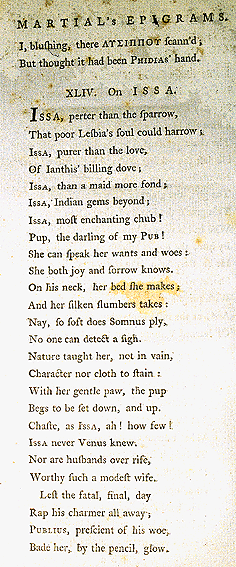
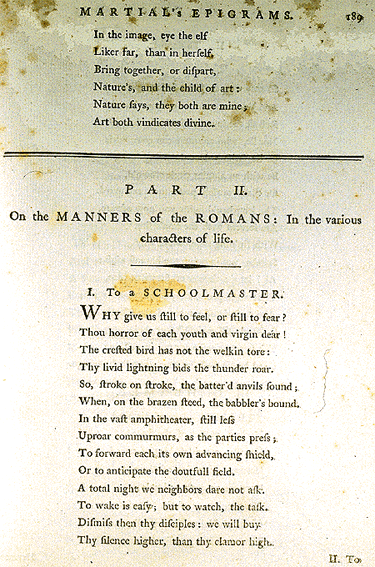
On the MANNERS of the ROMANS:
In the various characters of life.
I. "To a Schoolmaster."
Why give us still to feel, or still to fear?
Thou horror of each youth and virgin dear!
The crested bird has not the welkin tore:
Thy livid lightning bids the thunder roar.
So, stroke on stroke, the batter'd anvils sound;
When, on the brazen steed, the babbler's bound.
In the vast amphitheater, still less
Uproar commurmurs, as the parties press;
To forward each its own advancing shield,
Or to anticipate the doutfull field.
A total night we neighbors dare not ask.
To wake is easy; but to watch, the task.
Dismiss then thy disciples: we will buy
Thy silence higher, than thy clamor high.
Figure 4. Martial. The Epigrams of Marcus Valerius Martialis in twelve books: with commentary and translation into English by James Elphinston. [London, Printed by Baker and Galabin, 1782].
Martial, a Latin epigrammatist, was born in Spain, and spent most of his life in Rome. He was recognized as a man of wit and education, and had friends in many high places, including the emperors Titus, Domitian, and Trajan, and Pliny the Younger. His favorite form was the epigram. His works detail daily life and the manners of the culture in first century Rome.
Satire XIV, Juvenal
Figure 5. The Satires of Juvenal and Persius. [London, Printed for Jacob Tonson at the Judge's-Head in Chancery-Lane near Fleetstreet, 1693].
Translated into English verse by Mr. Dryden. Argument of Satire XIV: "Domestick Examples Easily Corrupt our Youth."
Ovid’s Metamorphoses
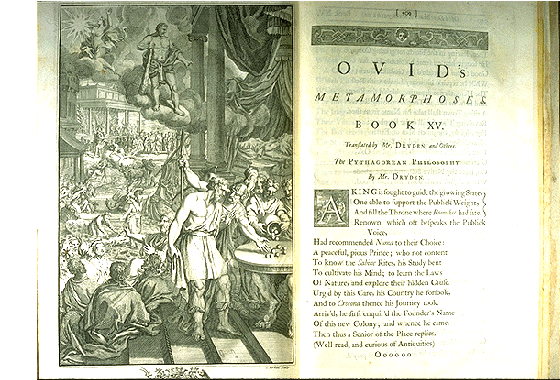
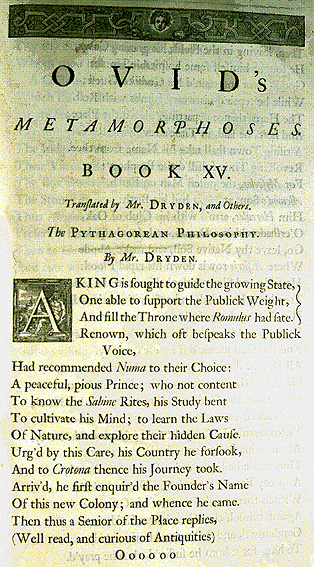
Ovid's
M E T A M O R P H O S E S
B O O K X V
Translated by Mr. Dryden, and Others.
The P
Y T H A G O R E A N
P H I L O S O P H Y.
By Mr. D R Y D E N
A king is sought to guide the
growing State,
One able to support the Publick Weight,
And fill the Throne where Romulus had fate.
Renown, which oft bespeaks the Publick
Voice,
Had recommended Numa to their Choice:
A peacefull, pious Prince; who not content
To know the Sabine Rites, his Study bent
To cultivate his Mind; to learn the Laws
Of Nature, and explore their hidden Cause.
Urg'd by this Care, his Country he forsook,
And to Crotona thence his Journey took.
Arriv'd, he first enquir'd the Founder's
Name
Of this new Colony; and whence he came.
Then thus a Senior of the Place replies,
(Well read, and curious of Antiquities)
Figure 6. Ovidius Naso, Publius. Ovid's Metamorphoses in fifteen books. [London, J. Tonson, 1717]. Translated by the most eminent hands.
Illustrated with engravings, this book measures 40 cm. With its dedication signed by S. Garth, it contains a series of tales in Latin verse by the Roman poet Ovid. Dealing with mythological, legendary, and historical figures, the tales are written in hexameters, in fifteen books, beginning with the creation of the world, and ending with the deification of Caesar and the reign of Augustus.
Juvenal, Satire VII "The Hope and Encouragement of all the Learn’d"
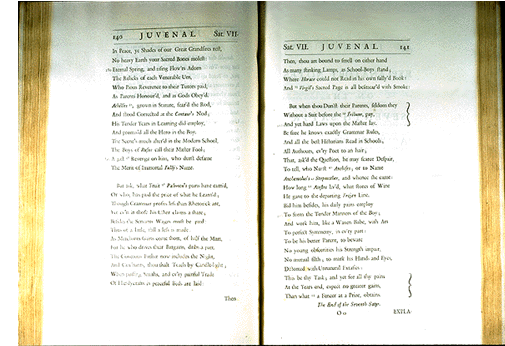
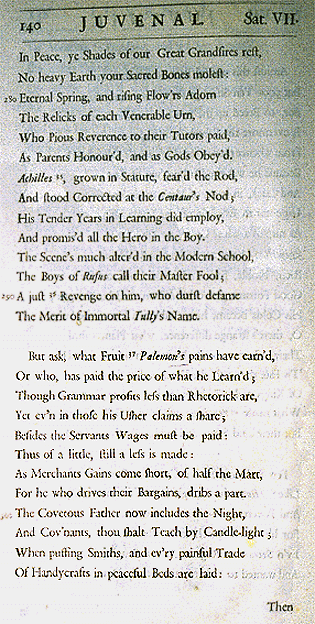
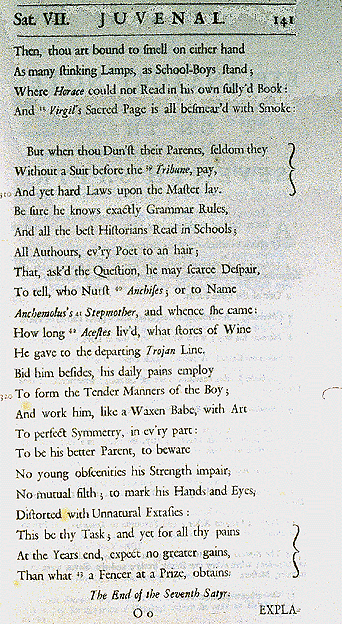
Figure 7. Juvenalis, Decimus Junius. The satires of Decimus Junius Juvenalis and of Aulus Persius Flaccus. [London, J. Tonson, 1713].
Translated into English verse by Mr. Dryden and other eminant hands.
Satire VII, Juvenal
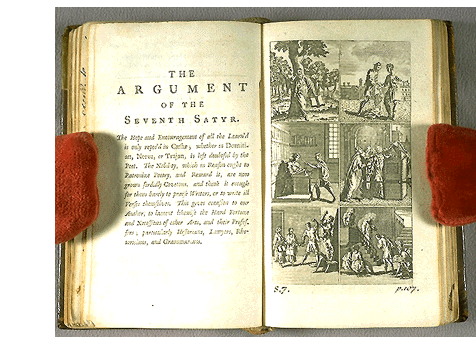

Figure 8. The Satires of Juvenal and Persius. [London, Printed for Jacob Tonson at the Judge's-Head in Chancery-Lane near Fleetstreet, 1693].
Translated into English verse by Mr. Dryden. Argument of Satire VII: "The Hope and Encouragement of all the Learn'd."
